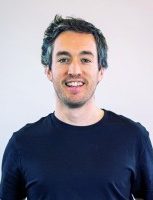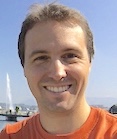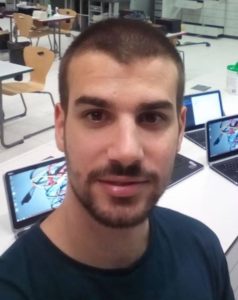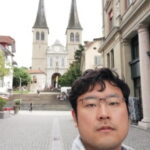What a year this was...!
This retrospective though, won't be about the unprecedented situation that we all went through. We'll take some time to revisit the highlights of our group's activities throughout this year. Let's go!
This year we were delighted to have new people joining our group:
 Yoann Boget joined our group in April 2020 as a PhD student and a research assistant. "April 2020? Not the best circumstances for a person to be integrated in a team", one would say. Well, thanks to Yoann's visits in the team's meetings even before April, and to his high motivation, he was quickly integrated in the group's spirit, its projects and activities, and soon after we started going back to the office we knew how he prefers that we serve him his coffee! Cheers Yoann! The direction of his research consists of investigating the generation of discrete data by deep generative models. As a field of experiment, he is currently working on de novo drug generation. He also works on the IAI - Innosuisse project, developing deep learning models for predictive maintenance.
Yoann Boget joined our group in April 2020 as a PhD student and a research assistant. "April 2020? Not the best circumstances for a person to be integrated in a team", one would say. Well, thanks to Yoann's visits in the team's meetings even before April, and to his high motivation, he was quickly integrated in the group's spirit, its projects and activities, and soon after we started going back to the office we knew how he prefers that we serve him his coffee! Cheers Yoann! The direction of his research consists of investigating the generation of discrete data by deep generative models. As a field of experiment, he is currently working on de novo drug generation. He also works on the IAI - Innosuisse project, developing deep learning models for predictive maintenance.
 Marc Desaules has been linked with our group since 2019, when he started working on his Master's Thesis under the supervision of Prof. Alexandros Kalousis. In 2020, he joined the team as a research assistant, working on the IAI - Innosuisse project and advancing his Thesis in the field of industrial AI. The world of industry is not new to Marc, as before his ongoing Master's in Statistics, he had completed a Master's in Microengineering in EPFL, and had a 10-year working experience in Cartier and Rolex. Impressive CV for a Master's student, right?
Marc Desaules has been linked with our group since 2019, when he started working on his Master's Thesis under the supervision of Prof. Alexandros Kalousis. In 2020, he joined the team as a research assistant, working on the IAI - Innosuisse project and advancing his Thesis in the field of industrial AI. The world of industry is not new to Marc, as before his ongoing Master's in Statistics, he had completed a Master's in Microengineering in EPFL, and had a 10-year working experience in Cartier and Rolex. Impressive CV for a Master's student, right?
 Nikolaos Kokkinis-Ntrenis also joined the team as a research assistant, after starting working on his Master's Thesis with our group. Nikos is close to complete his Master's in Computer Science in UNIGE, after having worked for 3 years as a software engineer at CERN, at the CLIC experiment. His research interests are in the areas of Reinforcement and Imitation Learning, which he studies in the context of the SimGait project, applying them in the modelling of pathological human locomotion.
Nikolaos Kokkinis-Ntrenis also joined the team as a research assistant, after starting working on his Master's Thesis with our group. Nikos is close to complete his Master's in Computer Science in UNIGE, after having worked for 3 years as a software engineer at CERN, at the CLIC experiment. His research interests are in the areas of Reinforcement and Imitation Learning, which he studies in the context of the SimGait project, applying them in the modelling of pathological human locomotion.
 Naoya Takeishi, joined our group in September as a postdoctoral researcher. Naoya has a PhD in Engineering from the University of Tokyo and is currently working on the effective and efficient integration of domain knowledge into machine learning. Naoya has an impressive track record in his research career, and is also a person always eager to assist his colleagues. Welcome Naoya!
Naoya Takeishi, joined our group in September as a postdoctoral researcher. Naoya has a PhD in Engineering from the University of Tokyo and is currently working on the effective and efficient integration of domain knowledge into machine learning. Naoya has an impressive track record in his research career, and is also a person always eager to assist his colleagues. Welcome Naoya!
Moreover earlier this year Joao successfully defended his Master's Thesis, entitled "Patient-Specific Pathological Gait Modelling with Relational Networks", and he now continuous to work in the team with the hat of a PhD Student.
Recruitment is still ongoing, as we have an opening for a PhD Student position that might interest you or people you know. Feel free to spread the word!
The special circumstances of this year were not an ally of a lot of mobility, such as the numerous internships of the previous years. Nevertheless, Jason's hard work and his outgoing spirit, that allowed him to have during the past years two internships in Apple AI research and one in Deep Mind, resulted in a job offer from Apple AI research. Jason started working in Apple this fall, while he is also close to submit and defend his PhD Thesis. We had our socially distant farewell drinks in September, but we shall meet again soon 🙂
In terms of publications, the team members produced 7 new papers in 2020. More particularly, Jason and Amina had their papers accepted in NeurIPS. Moreover, we had two papers on the subject of VAE conditional priors (Conference and Journal paper), and one on Lifelong generative modelling. Lastly we had two preprints released: one on Generative Adversarial Imitation Learning and one on the Data-driven approach of estimating positioning accuracy.
Research projects are a core part of the group's activities. The IAI Innosuisse project kicked-off in February 2020. In this project, we collaborate with Swiss and Korean partners, with our focus being on the utilisation of generative modelling in predictive maintenance. Moreover, Greg saw his proposal being accepted by the Swiss National Science Foundation (SNSF) and was awarded a research grant under the Spark funding scheme, for the project Eratosthenes. This project lays at the intersection of Greg's experience in positioning/localisation and the research interest of the team in generative modelling. It is a natural step forward, after the OrbiLoc Innosuisse project, where data (un)availability was identified as the main barrier of using data-driven methods of localisation in IoT networks (such as LoRaWAN or Sigfox). Eratosthenes will explore data augmentation and generative modelling approaches aiming to mitigate the barrier of the data collection of indoor and outdoor positioning. Lastly, the ongoing projects of the team (SimGait and MEDInA), continue with great excitement. You may find more information about projects and partners in the Collaborations page.
The members of our group very much enjoy inviting and picking the brains of external fellow researchers through invited talks and workshops. This year, we had the pleasure to host a talk by Guillaume Obozinski, the Deputy Chief Data Scientist at the Swiss Data Science Center. The pandemic didn't prevent us from co-organizing the Statistical Learning Workshop, as a virtual event, back in September. The videos of the very interesting talks of the Workshop are available on the event's webpage. Our intention is to capitalise on this experience and organise more similar events in the future, hopefully filling the relevant webpage.

The dmml group wishes you happy holidays and a happy 2021!!!
